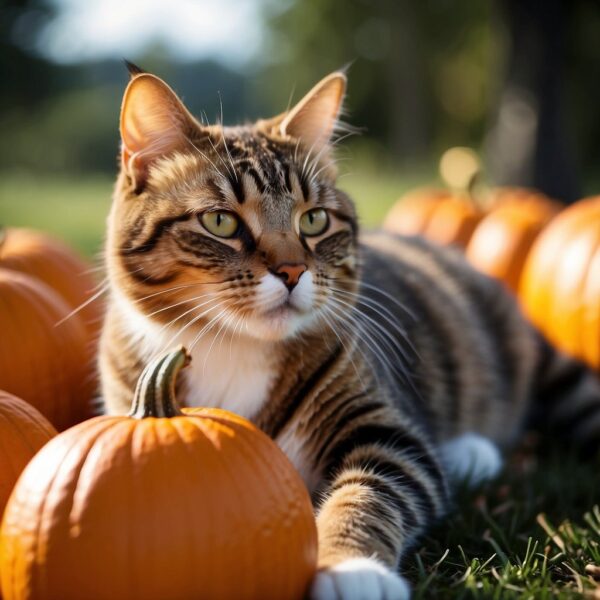
Is Pumpkin Safe for Cats?
Many cat parents are curious about the types of food they can safely incorporate into their pets’ diets. Pumpkin, for instance, has sparked interest for its potential health benefits. When fed in proper amounts, plain and cooked pumpkin is generally safe for cats. It is a good source of fiber and can support digestive health by helping with issues such as hairballs and constipation. Cats may also benefit from pumpkin’s low-calorie content, which can be advantageous for weight management.
However, while pumpkin can be a nutritious addition to a cat’s diet, it’s important to offer it correctly. Pumpkin should be given to cats in its plain form, without added sugars, spices, or preservatives that are often found in pumpkin pie fillings and spices. The nutritional content of pumpkin, like its high fiber, vitamins, and minerals, is beneficial; however, moderation is key. Too much pumpkin may cause stomach upset in cats.
Key Takeaways
- Plain, cooked pumpkin is generally safe and beneficial for cats when served in moderation.
- Appropriate portions of pumpkin can help with digestive issues and weight control.
- It is important to consult with a veterinarian before adding pumpkin to your cat’s diet.
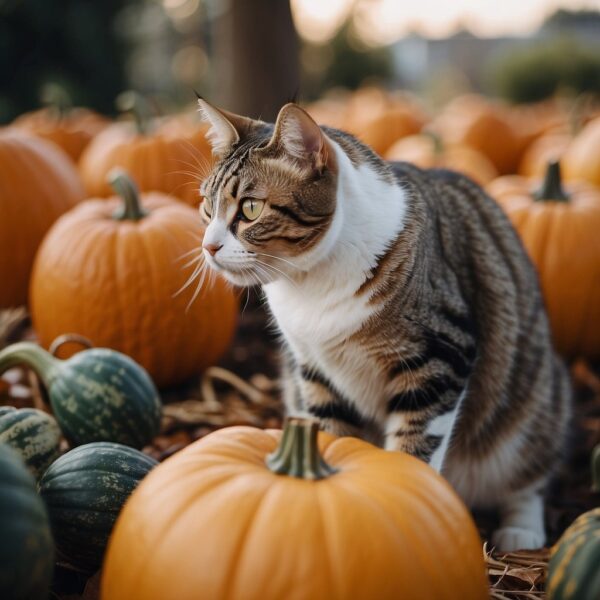
Health Benefits of Pumpkin for Cats
Pumpkin offers valuable nutritional perks for felines, playing a pivotal role in managing weight and supporting gastrointestinal health, particularly in addressing constipation.
Weight Management and Obesity Prevention
Pumpkin is a low-calorie food, making it an ideal treat for cats that need to maintain a healthy weight. With only about 15 calories per 100 grams, it can be an excellent addition to a cat’s diet for weight control purposes. Its high fiber content also contributes to a feeling of fullness, reducing the likelihood of overeating. Specifically:
- Calories: Minimal calories prevent unnecessary weight gain.
- Fiber: High levels increase satiety, which can prevent overeating.
Gastrointestinal Health and Constipation Relief
The soluble fiber in pumpkin aids in digestion and can help alleviate gastrointestinal issues such as diarrhea and constipation in cats. Its moisture content promotes hydration, which is beneficial for bowel movements and urinary tract health. In cases of constipation, pumpkin’s fiber can soften stools, making them easier to pass. For diarrhea, it can absorb excess water, helping to firm up the stools. Thus, pumpkin can be an integral part of a cat’s diet for maintaining gastrointestinal health. Key points include:
- Fiber: Helps with regularity and eases constipation.
- Moisture: Aids with digestion and supports urinary tract health.
- Bowel Movements: Promotes easier bowel movements and helps firm up stools.
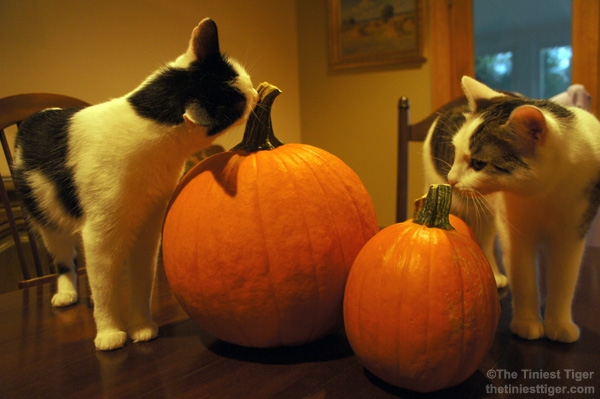
Appropriate Forms and Amounts of Pumpkin for Cats
Pumpkin can be a healthy addition to a cat’s diet when offered in the right form and amount. Proper preparation is key to ensuring that this supplement is safe for feline consumption.
Choosing the Right Type of Pumpkin
Fresh Pumpkin: Fresh pumpkin should be without added sugars and spices. It should be thoroughly cooked to make it easy for cats to digest.
Canned Pumpkin: Always opt for plain, cooked canned pumpkin, not pumpkin pie filling. Canned pumpkin should be free of additives, salts, and sweeteners. Canned pumpkin puree is often a convenient and safe choice for pet owners.
Safe Preparation and Cooking Methods
Cooking: Raw pumpkin is hard for cats to digest, so it should be cooked before offering it to your pet. Cooking methods such as roasting or steaming are suitable. To roast, cut the pumpkin into chunks and bake it until tender.
Handling: Ensure the cooked pumpkin has cooled down significantly before feeding it to your cat to prevent any risk of burning their mouth.
Recommended Serving Sizes and Frequency
Serving Sizes:
- Kittens: ½ teaspoon per day
- Adult Cats: 1 to 4 teaspoons per day
Frequency: Introduce pumpkin into a cat’s diet slowly to monitor their reaction. The pumpkin can be mixed with their wet food once or twice daily, but should not exceed 4 tablespoons per day. Consultation with a veterinarian can provide cat-specific dietary recommendations to determine the right dosage for individual needs, ensuring moderation is maintained.
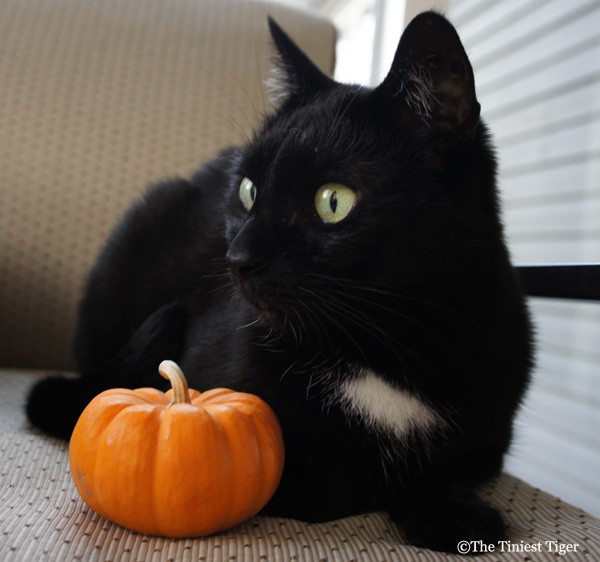
Nutritional Profile of Pumpkin
Pumpkin provides a range of dietary benefits that are beneficial to a cat’s health, particularly through its rich vitamin content and support of digestive health due to its fiber.
Vitamins and Minerals in Pumpkin
Pumpkins are packed with essential nutrients that can be beneficial to feline health. They are a significant source of vitamins such as vitamin A, which is important for eye health, and antioxidants that help in preventing damage to cells.
- Vitamin A: Essential for vision and immune function
- Vitamin C: Supports immune health
- Vitamin E: Acts as an antioxidant
- Potassium: Important for muscle function
- Iron: Helps in oxygen transportation in the blood
These minerals and vitamins contribute to the overall nutritional benefits of adding a small amount of pumpkin to a cat’s diet.
Fiber Content and Digestive Health
The fiber in pumpkin is an asset to a cat’s digestive system. Adequate fiber can help keep the cat’s gut healthy and can be particularly helpful in managing constipation and diarrhea.
- Soluble Fiber: Helps to soften stool
- Insoluble Fiber: Adds bulk to stool and aids in regular bowel movements
By contributing to a well-regulated digestive process, pumpkin can provide significant health benefits to cats, such as supporting a healthy weight and preventing gastrointestinal issues.

Potential Risks and Considerations
When considering pumpkin as a treat for cats, it’s essential to be aware of the possible risks such as food intolerances and the presence of toxic ingredients in some pumpkin products.
Understanding the Risks of Unregulated Treats
Cats may enjoy pumpkin as an occasional treat, but unregulated feeding can lead to health issues. A major concern is the fiber content in pumpkin, which, while beneficial in moderation, can cause digestive upset such as diarrhea or constipation if consumed in excess. Guardians should follow these guidelines:
- Start Small: Introduce pumpkin to a cat’s diet gradually.
- Monitor Response: Keep an eye on the cat’s digestion and stool quality.
Identifying Allergic Reactions and Food Intolerances
Allergic reactions or food intolerances can occur, though they are not common with pumpkin. Cat parents should be vigilant for signs that include:
- Itching or skin irritations
- Gastrointestinal upset such as vomiting or diarrhea If any adverse reactions are noticed, discontinue feeding pumpkin immediately and consult a veterinarian.
Avoiding Toxic Ingredients and Unsafe Pumpkin Products
It is imperative to give cats plain, cooked pumpkin without spices or additives. Pumpkin pie filling is unsafe due to ingredients like cinnamon, nutmeg, sugar, and salt which can cause toxicity. Remember these key points:
- No Spices Added: Only feed plain canned or cooked pumpkin.
- Ingredient Check: Always read labels to ensure there are no harmful additives.
- Avoid Sweets: Any form of sweetened pumpkin, like pie filling, should be completely avoided due to the high sugar content and potential presence of xylitol, a sweetener that is toxic to cats.
Consulting with a Veterinarian
When considering pumpkin as an option for your cat’s dietary needs, seek a veterinarian‘s insight. Veterinarians are trained to understand the intricacies of pet healthcare and can provide professional advice on how to incorporate pumpkin into your cat’s diet effectively.
If your cat is experiencing digestive issues, such as constipation or diarrhea, a veterinarian can evaluate the severity of the condition. They can recommend whether pumpkin is an appropriate treatment and advise on the correct dosage. Introducing new foods like pumpkin might benefit your cat, but it has to be done with professional guidance to ensure your pet’s health isn’t compromised.
During the consultation, a vet might ask questions about your cat’s overall health and current diet. Here are some topics a veterinarian may cover:
- The cat’s age and weight
- Existing health issues
- Current medications
- Dietary history and habits
A veterinarian will help tailor a diet that suits your cat’s individual needs. They may suggest starting with a small amount of pumpkin and observing how your cat responds, with adjustments made as necessary.
Remember, professional vet advice is invaluable to your cat’s health. A balanced diet is important, and a veterinarian is the best resource to ensure any inclusion like pumpkin contributes positively to your pet’s nutrition and wellbeing.
Closing Thoughts
Cats can eat pumpkin, and in many cases, it serves as a beneficial supplement to their diet. It is not only safe, but can also assist with gastrointestinal health due to its high dietary fiber content. Fiber can help regulate cats’ digestion and can be especially helpful for individuals experiencing constipation or diarrhea.
When considering feeding your cat pumpkin, it’s important to serve it cooked and without any added sugars or spices. A small spoonful of plain canned pumpkin, not pumpkin pie filling, can be mixed into their regular food. However, remember that moderation is key. Too much pumpkin might lead to gastrointestinal distress, so it should only be a small part of a cat’s diet.
For cats that are managing their weight, pumpkin can be a low-calorie treat option to help them feel full without adding unnecessary calories. But before making any changes to a cat’s diet, consulting with a veterinarian is advisable to ensure it suits the particular needs of the pet.
In conclusion, pumpkin can be a healthy addition to a cat’s meals when given appropriately. Responsible pet parents should integrate this food into their cat’s diet thoughtfully, always prioritizing the overall health and well-being of their feline friends.
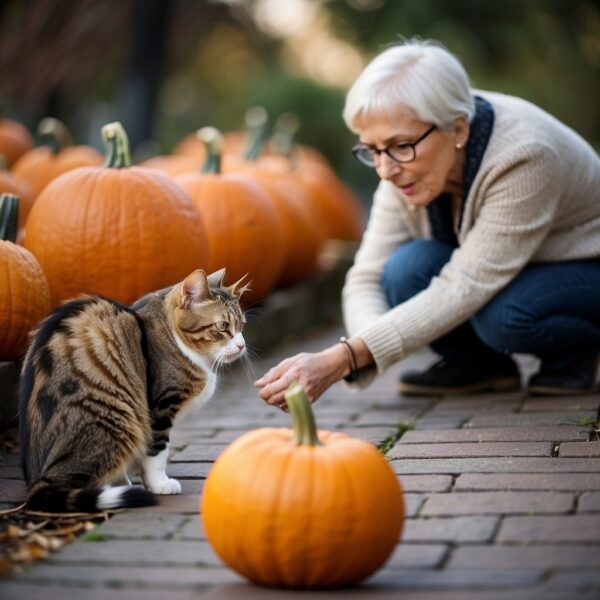
Frequently Asked Questions
Cats can often benefit from the addition of pumpkin to their diet, especially when facing digestive issues. Here’s how to safely incorporate this fibrous food into their meals.
Can pumpkin help cats with constipation issues?
Pumpkin is high in fiber, which can aid in the digestion of cats. It helps in keeping the cat’s stool soft, which may relieve symptoms of constipation. Cat parents have found that a small amount can help regulate their cat’s bowel movements.
How should pumpkin be prepared for cats?
For cats, pumpkin should be plain and cooked without any added sugars or spices. Fresh pumpkin can be baked, or plain canned pumpkin may be used. It’s important to avoid pumpkin pie filling, which contains additives that are not suitable for cats.
What is the recommended amount of pumpkin to give a cat for digestive problems?
The typical recommendation is 1 to 4 tablespoons of pumpkin per day for an adult cat, depending on their size and specific needs. Start with a smaller amount and adjust as necessary. However, it’s best to consult with a veterinarian for the most appropriate dosage for individual cats.
Is it safe for cats to consume pumpkin daily?
Moderate, regular consumption of pumpkin can be safe for cats. However, it’s essential to keep the portions small and consistent as part of a balanced diet. Guardians should monitor their cats for any adverse reactions and consult with a vet for long-term dietary changes.
Can serving pumpkin to cats cause gastrointestinal upset?
While pumpkin can be helpful for digestive health, too much pumpkin may lead to diarrhea or other gastrointestinal issues. Cats should be introduced to pumpkin gradually, and serving sizes should be limited to avoid upsetting their stomach.
What are the potential benefits of feeding pumpkin to cats?
Pumpkin provides dietary fiber, which supports digestive health and can assist with hairball control. The moisture content of pumpkin also supports hydration, while vitamins and minerals like vitamin A and potassium contribute to overall nutrition.